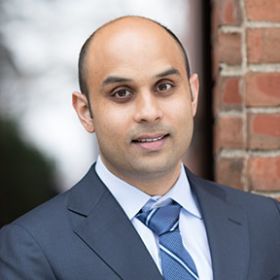Impact Stories
Platform for Dialogue
Sudev Sheth
“Although I arrived as a historian of early modern South Asia, HBS catalyzed a process of broadening me into a scholar of comparative societies and the history of global capitalism.”
My year at Harvard Business School as the Newcomen Fellow in Business History was transformative for my research, teaching, and outlook on scholarship for the twenty-first century. The fellowship not only provided me with unparalleled resources, but also gave me a platform to dialogue with faculty across specializations and to build relationships with inspiring MBA students from all over the world. While the School’s fostering of big ideas challenged me to learn and develop new vocabularies, the vibrant community of scholars affiliated with the Business History Initiative provided valuable critiques that elevated my work in a number of ways. Although I arrived as a historian of early modern South Asia, HBS catalyzed a process of broadening me into a scholar of comparative societies and the history of global capitalism.
One of the most rewarding experiences as a Newcomen Fellow was co-teaching with several faculty. With Geoffrey Jones, I participated in the provocative and lively MBA course Entrepreneurship & Global Capitalism. This course explored the making of the modern world through rich histories of entrepreneurship. As I witnessed students passionately debating French fashion, American and Indian cinema, Middle Eastern oil, Chilean minerals, Japanese and Greek shipping, and much more, to synthesize historical drivers of global change, I became convinced by the power of true Socratic teaching as distilled in the classic HBS case method. Equipped with this powerful pedagogy and invaluable knowhow, I very much look forward to incorporating aspects of case method teaching in my classes going forward.
I also had the unique privilege of co-teaching a Harvard-wide comparative history seminar composed of MBA and PhD students on the Great Divergence debate. Working with specialists of China, Southeast Asia, Europe, the Middle East, and the United States, I learned that a truly comparative approach to understanding social change requires the coming together of faculty expertise in planned and sustained ways. HBS has shown me that such collaboration across ranks and schools to build creative curriculum is possible and desirable given the immense benefits it brings to debate and discussion in the classroom.
As a historian, discovering new archival materials is no doubt exhilarating. And while I did much of this at the iconic Baker Library, I also had the privilege of generating new primary source materials for generations to come as part of the Creating Emerging Markets oral history project. I cherish the one of a kind opportunity I had to travel to India to conduct an interview with a leading CEO in textiles and fashion for this project. The in-depth video and complete transcript will not only serve my own research on Indian business families, but will also aid innumerable scholars studying the unique challenges and opportunities facing emerging markets around the world.
Towards the end of my fellowship and with the unstinting support of the Business History Initiative, I was also able to bring together a diverse group of scholars in the fields of history, economics, and management to explore the unconventional as it relates to researching entrepreneurship and business. This conference focused on new sources and techniques for studying markets past and present, and infused new energy and methodological perspective into my own thinking about business and historical change across the globe.
The most lasting impact of the Harvard-Newcomen Fellowship and the HBS experience was its reorienting of my scholarly trajectory. Having learned firsthand the benefits of combining insights from the social sciences and humanities with questions raised more explicitly by management studies, I am confident that my research and teaching will thrive as I continue to work at the intersection of history and business in the years to come.

